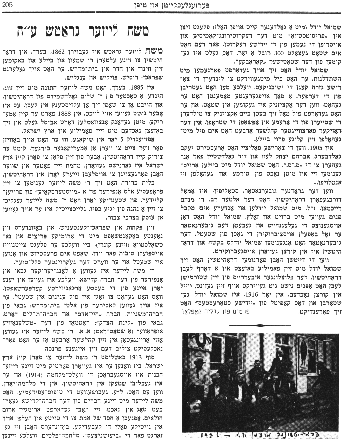
[Page 205]
[photo:] Drohitchin Jews in 1936
Shmuel Yudel (with a gold chain around his neck) would meet with the recruiting committee, reading off the names of Jewish recruits. For this work he was paid 300 rubles a years, and the money was provided by the town budget.
Shmuel Yudel also had to serve as mediator to alleviate Czarist decrees on the Jewish villagers who were expelled from their villages. There were many nervous moments when the tax officials arrived in town, and Shmuel had to appeal to them to alleviate the taxes on the poor, and waive penalties. His clever wife Beila frequently helped him out in this thorny work.
In 1905, when the Czarist police arrested Yaakov Goldberg, Avraham Yitzchak Lev and David Goldstein for membership in the socialist party, Shmuel Yudel and Beila took them out of prison in the middle of the night and helped them escape. When Stolipin, the governor of Grodno, once passed through Drohitchin, the old rabbi, R. Menachem Reichman, and Shmuel Yudel and others welcomed him with bread and salt. Shmuel Yudel then took advantage of the opportunity to ask the governor to arrange to pave the streets of Drohitchin. The governor accepted Shmuel Yudel's request, and shortly thereafter the roads of Drohitchin were paved.
When the Germans occupied Drohitchin, Shmuel Yudel and his family moved to a village near Drohitchin. This sudden change in his stormy life evidently had a negative effect on his health, since shortly thereafter, in 1916, Shmuel Yudel passed away, thus ending the chapter of the Jewish Elders in Drohitchin.
Information from Gedaliah Kaplan
Moshe Leizer Gratch
Moshe Lazer Gratch was born in approximately 1862 in Drohitchin to his parents, R. Shimon and Beila. He learned in kheder and the House of Study, and also studied Russian, Polish and English. In approximately 1882, Moshe Leizer married his wife, Hinda, a daughter of R. Shalom Goldschmidt of Drohitchin, and started to earn a living. It didn't go very well, however, and in 1888 Moshe Leizer traveled to the United States with the intention of collecting some money to be able to move with his family to Palestine.
After spending 5 years in Chicago, where he also acquired US citizenship, he returned to Drohitchin. However, his plans to move to Palestine didn't bear fruit because his father and father-in-law decided to live out their lives in Drohitchin. With no other choice, Moshe Leizer got involved in a workshop manufacturing women's clothes because he always wanted to earn his own money. He was also a philanthropist in the community.
His cleverness and linguistic abilities, and especially his relationship with local gentile aristocrats and officials (his customers), enabled him to help his fellow Jews and develop a reputation to be able to become the head community leader.
R. Moshe Leizer was a long-standing trustee and administrator of the burial society, which in those days was one of the best-organized organizations, and which carried a lot of weight in the community. He was also the treasurer of the Old House of Study, and ran the Mishnah Study Group, Jewish Law Study Group and Psalm Reciters' Group. He ran the organization responsible for providing room and board for poor visitors, and councilor of the local council. R. Moshe Leizer was so involved in his community work that he neglected his own livelihood.
At the end of 1913, Moshe Leizer decided to move to Palestine, but by the time all his plans were ready to be implemented, World War I broke out in 191, and he was stuck in Drohitchin. During the War years and the typhus epidemic, Moshe Leizer and his associates at the burial society worked night and day, preparing the dead for burial and helping the living. They were especially involved in assisting war refugees who came to
[Page 206]
[photo:] From right, Shalom, R. Moshe Leizer (father), Nissel, Shmuel Velvel, Hinda (mother) and Sender.
Drohitchin from the battle areas, and who became the first victims of the epidemic. Over the years, R. Moshe was in charge of the Drohitchin Record Book, in which he would record the most important events in town. Unfortunately, no one knows what happened to the Book.
Moshe Leizer finally realized his dream in 1923, when he departed for Palestine and Jerusalem, where he and his wife lived out their lives. R. Moshe died on the 8th of Tishrei [October 7], 1943, and his wife Hinda died on the 30th of Kislev [Dec. 30], 1940.
The Gratches had four sons: Nissel (arrived in the United States, and became an active member of Poalei Zion. He died in Chicago on 29 Av [August 26], 1908); Shmuel Velvel ([lives] in Jerusalem since 1904, and attended the Torat Chaim yeshiva from 1904-1919); Sender (a Hebrew teacher. He arrived in the United States in 1920, and [lives] in Los Angeles), and Shalom (a respected businessman in Chicago).
Previous Page
|
Next Page
JewishGen, Inc. makes no representations regarding the accuracy of
the translation. The reader may wish to refer to the original material
for verification.
JewishGen is not responsible for inaccuracies or omissions in the original work and cannot rewrite or edit the text to correct inaccuracies and/or omissions.
Our mission is to produce a translation of the original work and we cannot verify the accuracy of statements or alter facts cited.
 Drogichin, Belarus
Drogichin, Belarus
 Yizkor Book Project
Yizkor Book Project
 JewishGen Home Page
JewishGen Home Page
Copyright © 1999-2025 by JewishGen, Inc.
Updated 13 Dec 2001 by LA